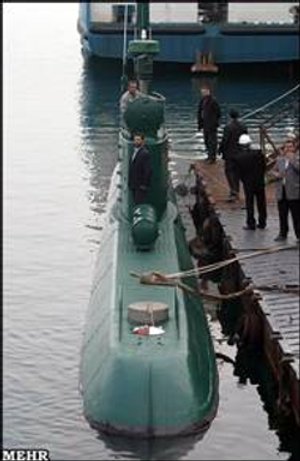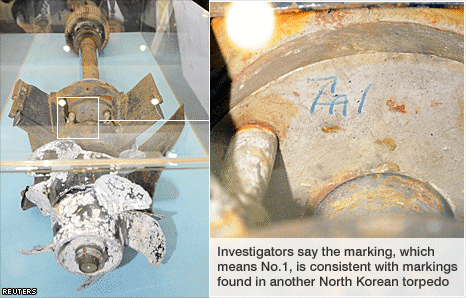 The forward half of teh hulk of the Corvette Cheoson being raised from the Yellow Sea
The forward half of teh hulk of the Corvette Cheoson being raised from the Yellow Sea
On March 26th at 2110 hrs local the 1200 ton South Korean Corvette Cheonan (PCC-722) was torpedoed by a North Korean Submarine about 1 nautical mile from Baengnyeong Island. The assailant appears to have been a North Korean Yeono Class miniature submarine using a North Korean CHT-02D 21” torpedo using acoustic homing mechanism set for a detonation under the hull of Cheonan at 6-9 meters depth. There is the possibility that a Song class coastal submarine could have been involved but the likelihood is a Yeono class boat based on the proximity to land and the observation of a number of “small submarines” departing base a few days before and returning a few days after to their tender. The blast created an underwater shockwave and bubble effect which broke the back of the ship causing it to sink in less than 5 minutes with the loss of 46 crew members.
 The probable assailant a Yeono or Yono class Miniature Sub and an Iranian variant below
The probable assailant a Yeono or Yono class Miniature Sub and an Iranian variant below
The sinking of Cheonan was the first sinking of a warship by a hostile submarine since the Argentine light cruiser the General Belgrano was sunk by the Royal Navy nuclear hunter-killer attack submarine Conqueror on May 2nd 1982 during the Falkland war. The sinking of the Belgrano was controversial but occurred in the context of active hostilities and which posed no real threat to regional destabilization or a war that could easily escalate into a nuclear, chemical and biological conflict. The Cheonan was sunk by the North Koreans in a clear violation of the Korean Armistice and represents such a brazen move by the North Koreans that one has to wonder what purpose that it served. There are reports that Kim Jong Il ordered the attack in retaliation for a confrontation in the same area in November 2009 in which a North Korean ship was heavily damaged.
 The last warship sunk by a hostile submarine
The last warship sunk by a hostile submarine
The effects are now being felt following the May 20th release of the international investigation of the sinking which confirmed with hard evidence that the torpedo was North Korean and that there were no other possibilities for the sinking. (http://www.mnd.go.kr/mndEng_2009/WhatsNew/RecentNews/index.jsp#wrap ) The North Koreans reacted with anger toward the report while South Korea, the United States, Japan, Australia, Canada and the UN made statements condemning the sinking. In the following days the US and South Korea announced naval exercises (http://news.bbc.co.uk/2/hi/world/asia_pacific/10150379.stm ) (http://www.csmonitor.com/USA/Military/2010/0524/Pentagon-dials-up-pressure-on-North-Korea-for-Cheonan-sinking ) and on the 24th the South Koreans suspended economic relations and assistance to the North and announced the renewal of psychological warfare against the North. The North Koreans have responded in kind severing all relations with the South, threatening to attack sites broadcasting into the North and announced that it gave its military the order to prepare for war. http://news.yahoo.com/s/ap/20100525/ap_on_re_as/as_skorea_ship_sinks;_ylt=Alwl3biZwLFab7TyXX4HwRz9xg8F;_ylu=X3oDMTM5NTExM2R2BGFzc2V0A2FwLzIwMTAwNTI1L2FzX3Nrb3JlYV9zaGlwX3NpbmtzBGNjb2RlA21vc3Rwb3B1bGFyBGNwb3MDMgRwb3MDMgRzZWMDeW5fdG9wX3N0b3JpZXMEc2xrA25rb3JlYXNldmVycw
 North Korean Torpedo components from the sinking of the Cheonan
North Korean Torpedo components from the sinking of the Cheonan
The North on the 21st announced that “From this time on, we will regard the situation as a phase of war and will be responding resolutely to all problems in North-South relations,” and that “If the South puppet group comes out with ‘response’ and ‘retaliation’, we will respond strongly with ruthless punishment including the total shutdown of North-South ties, abrogation of the North-South agreement on non-aggression and abolition of all North-South cooperation projects.” (http://www.stuff.co.nz/world/asia/3725039/North-Korea-declares-phase-of-war-with-south )
Secretary General of the United Nations Ban Ki Moon said that the Security Council should take action against North Korea stating “I’m confident that the council, in fulfilling its responsibility for the maintenance of international peace and security, will take measures appropriate to the gravity of the situation.” (http://www.undispatch.com/node/9910 )
The situation seems to escalate by the hour as additional nations condemn the North Koreans and movement in the UN to do sop as well. With the problem of succession in the North Korean leadership and potential struggles for internal power between the North Korean military and others within Communist Party and government it is hard to say who might gain in this situation. There are reports that part of the reason for the attack was the need for Kim Jong Il to secure the place of his son to leader the regime if he is incapacitated or dies. The succession of Kim to the leadership was unusual as it was the first time in a Communist nation that the son of the national leader succeeded his father. It is possibility that senior military or party leadership could oppose such a move.
There are a number of scenarios for this to play out. Of course one would be for the North to stand down however that would be an act of weakness and loss of face for the regime after sinking a South Korean warship. The other alternatives include the full fledged resumption of the Cold War on the peninsula or even the outbreak of a regional war which could draw in other nations and involve the use of nuclear, biological or chemical weapons on a large scale. Any such situation would devastate the economies of much of Asia which in tour could cripple the world economy at a time when the European Union is in crisis, the United States is struggling its way out of a recession and many other nations are experiencing economic crisis or downturn.
This is a very dangerous situation and as one who has spent time on the Korean DMZ I can imagine almost nothing worse for the world than a war in Northeast Asia, perhaps a major showdown in the Arabian Gulf with Iran or a major conflict involving Israel and Iran or other Middle Eastern states, but not much other than those scenarios. The situation has also demonstrated the threat to warships in the littorals from comparatively simple, cheap and deadly platforms firing weapons based on World War Two technology. The reality for naval surface forces be they in the Korean littorals, the Arabian Gulf or Gulf of Oman is that low tech weaponry on low tech platforms in congested waters can deal deadly blows to unsuspecting warships.
This situation will need to be watched as it has the potential to get worse with dire consequences.



lol do you seriously attempt to tell us that North Korea made a violation?
Somehow I think that the North Koreans sinking a South Korea ship is at least a violation of some kind. At least a Yellow card.